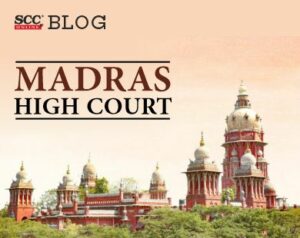Madras High Court: In a writ petition to call for the entire records starting from the Council resolution dated 30-05-2022 passed by the Council of the Greater Chennai Corporation and the consequential proceedings and quash the entire proceedings, being illegal and ultravires to the provisions of Section 100 of the Chennai City Municipal Corporation Act, 1919, Anita Sumanth, J. held that the amendments by way of impugned Government Order, Gazette Notification dated 11-04-2022 and Council Resolution dated 30-05-2022 stand confirmed and challenges to the same are dismissed, and set aside the Property tax General Revision Notices for the period 2022-23 second half . Further, it directed that qua the writ petitioners, the amendments will be operative from the first half of 2023-24, i.e., 01.04.2023 onwards. It accepted the challenge to the property tax demands. Moreover, it directed the Corporations to ensure that the websites are kept robust and grievance mechanisms are put in place to enable all property tax assesses to seek clarifications regarding any aspect of property tax assessments.
Issues:
1) Whether the plinth area basis could be adopted for determining the annual value of buildings?
2) Whether the Municipal Administration and Water Supply Department(‘MAWSD’), has adopted the plinth area basis in making the general revision of assessments?
3) Whether the fair rent formula is to be uniformly applied by MAWSD in determining the annual value of all buildings in the City as urged by the petitioner?
4) Whether the reason as to why and how the revision of assessments has taken place in a particular case should be set out in the notices issued under rules 2-B, 3 and 3-A of schedule IV to the Madras City Municipal Corporation Act, 1919?’
The Court said that the first question was answered in favour of the petitioner stating that property tax cannot be levied on plinth area basis. Further, answering the second issue, that is related to whether the plinth area basis had been applied in effecting general revision, which, on the facts presented by respondents, the Court declined to answer.
While dealing with the third and fourth issues as to whether the basis of revision must be set out in the pre-assessment notice, the Court considered the specific argument that the annual value must be determined only with reference to the fair rent formula under the Madras Buildings (Lease and Rent) Control Act, 1960.
The conclusion was that there was no fetter placed upon the authorities to only follow the fair rent formula contemplated under the Rent Control Act in respect of those buildings which do not come under, or at exempted from the purview of the Rent Control Act. In the cases of other buildings, as a norm, the fair rent formula provided for in the Rent Control Act should normally be followed in the determination of the annual value of buildings.
Placing reliance on MCD v. Mehrasons Jewellers (P) Ltd., (2015) 9 SCC 719 , Commr. v. Griha Yajamanula Samkhya, (2001) 5 SCC 651, Lokmanya Mills Barsi Ltd. v. Barsi Borough Municipality, (1962) 1 SCR 306, the Court concluded the following:
-
Where the enactments stipulate a specific method for arriving at the value of the property, such a method must be applied by the State. The statutory method stipulated is the Annual Rental Value(‘ARV’)and this must form the basis of levy of property tax.
-
Where the specific methodology for determination of the ARV is set out either in the Statute or connected Rules and Regulations, the authorities are bound to follow the same. In the present case, there is no such stipulation, and hence the authorities are vested with the discretion to arrive at the proper methodology to determine ARV, such as BSR, application of the formula under the Rent Control Act or any other, for that matter.
-
Such methodology as applied must be one which is normally accepted as being a reasonably accurate method for determining annual value and must not present difficulties in the mode of computation involved.
-
Any change in methodology, if the governing enactment provides for the same, must be carried out in strict compliance with the statutory provisions and in compliance with the principles of natural justice. In the present case, the respondents have applied Basic Street Rate in property tax assessments since 1998 and hence such a situation, of change in methodology, does not arise.
Thus, it said that there is no flaw in the authorities adopting the mean average rental value of properties in a given street to formulate a BSR. Further, the Court rejected the petitioner’s submission to the effect that it is only rental value as computed under the Rent Control Act that can form the basis of determination of Annual Letting Value (‘ALV’), as the 1919 Act only requires the determination of annual value to be based on ALV and there is no dispute that this is the procedure that is perpetrated now. Further, the entitlement of the organisation to enforce the rights of retirees and its locus standi were held to be unquestionable.
[K. Balasubramaniam v. Commissioner, 2022 SCC OnLine Mad 6120, decided on 23-12-2022]
*Apoorva Goel, Editorial Assistant has reported this brief.

